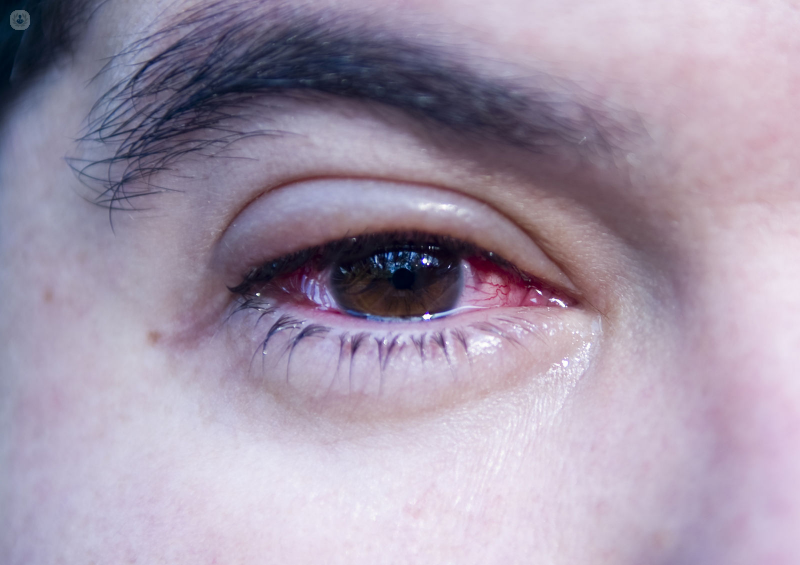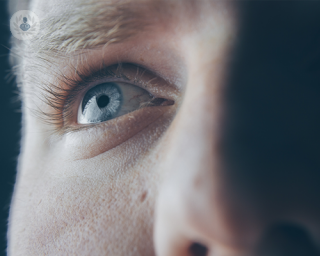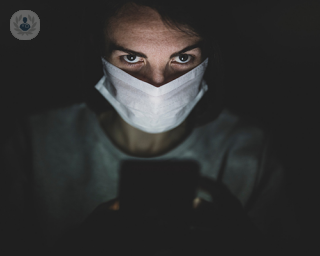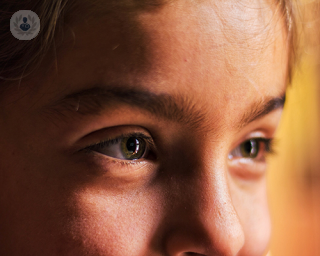Conjunctivitis
Miss Vickie Lee - Ophthalmology
Created on: 11-13-2012
Updated on: 06-29-2023
Edited by: Karolyn Judge
What is conjunctivitis?
Conjunctivitis is the inflammation of the conjunctiva, the transparent membrane which covers the white part of the eye and the inside of the eyelids. Sometimes referred to as 'pink eye', this inflammation can be caused by allergies or by an infection:
- Viral conjunctivitis
- Bacterial conjunctivitis
- Allergic conjunctivitis
Conjunctivitis generally does not affect vision. Infectious conjunctivitis can easily spread from person to person.

What's the outlook for conjunctivitis?
Conjunctivitis usually affects both eyes at the same time, although it can affect one eye more than the other. Infectious conjunctivitis will usually last about 10 days to four weeks, and is a very common disorder, especially in children.
What are the symptoms of conjunctivitis?
The most common symptoms of conjunctivitis are:
- Redness
- Burning
- Itchiness
- Yellow or green mucus or discharge ("sticky eye").
The first signs of conjunctivitis include:
- Pink or red colour in the white of the eyes;
- Increased production of tears;
- Sensation as though there's a foreign body in the eyes, or an urge to rub the eyes;
- Conjunctiva and/or eyelid swelling.
How is conjunctivitis diagnosed?
Tests may include:
- An eye test
- Assessment of the eye surface
- An assessment of the tear film and drainage
What causes conjunctivitis?
The causes may be:
Viral infection
Viral conjunctivitis is very contagious, but usually resolves on its own within 10 to 28 days, without the need for medical treatment.
Bacterial infection
Bacterial conjunctivitis, which causes "sticky eye" with yellow/greenish discharge; in newborn infants it can cause severe damage to the eyes if left untreated.
Allergies
Allergic conjunctivitis, which is caused by pollen or dust. This type of conjunctivitis can be seasonal (pollen) or appear in outbreaks throughout the year (dust and pet fur).
Severe forms of allergic eye disease occur in people with atopic conditions such as asthma or eczema, and in people with specific susceptibility (vernal keratoconjunctivitis).
- Substances that cause irritation (for example, chemicals such as cleaning products).
- Products used for contact lenses, and eye drops or ointments that have been contaminated.
Can conjunctivitis be prevented?
Simple preventive measures can be taken on a day-to-day basis to significantly reduce the risk of getting conjunctivitis:
- Don't share personal hygiene items such as cloths and hand towels.
- Cover your nose and mouth when coughing and sneezing, and avoid rubbing or touching your eyes.
- Never share contact lenses.
- Wash your hands often.
- Keep surfaces clean, such as kitchen tables, bathroom utensils, taps and shared telephones with an appropriate antiseptic cleaner.
- If you have seasonal allergies, ask your doctor what you can do to minimise your symptoms before they start.
- If you wear contact lenses, you should make sure you follow the advice of your optometrist or ophthalmologist for their care and replacement.
- To go swimming, use swimming goggles to protect your eyes from bacteria or other microorganisms in the water that can cause conjunctivitis.
- Remove contact lenses to avoid retaining bacteria between your eyes and your lenses before showering, using a hot tub or getting into water of any kind.
How long is conjunctivitis contagious for?
Bacterial conjunctivitis is contagious as soon as symptoms appear and for as long as discharge comes from the eye.
Viral conjunctivitis is generally contagious before symptoms appear. It can remain contagious as long as the symptoms last.
How is conjunctivitis treated?
Depending on the type of conjunctivitis, the following treatments might be needed:
- Viral conjunctivitis: In most cases, viral conjunctivitis will run its course within 10-28 days without medical treatment. Simple self-care measures such as cold compresses to the eyelids several times a day can relieve symptoms. It is important not to share compresses, as viral conjunctivitis is highly contagious.
- Bacterial conjunctivitis: This usually resolves within a few days without any treatment. If it does not resolve, antibiotic eye drops or ointments may be prescribed. In newborn babies (less than one month old), bacterial conjunctivitis is an emergency, and the child needs to be taken to a general practitioner (GP), the accident and emergency department, or a paediatrician immediately.
- Allergic conjunctivitis: Depending on the severity, over-the-counter anti-histamine eye drops can help. Doctors can prescribe stronger drops such as dual-acting anti-histamine and mast cell stabilising eyedrops. Hospital specialists can prescribe treatments for severe allergic eye disease.
Which specialist treats conjunctivitis?
Ophthalmologists diagnose and treat diseases that affect eyes and vision, including conjunctivitis. In children and teenagers, it is best to consult a paediatric ophthalmologist, as they are prone to developing more severe eye inflammation than adults.












